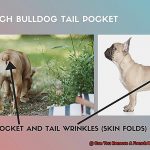Do All French Bulldogs Have To Be Inseminated?
French Bulldogs, those adorable little bundles of squishy faces and endearing personalities, have captured the hearts of dog lovers across the globe. But amidst all the love and adoration, one misconception persists – the belief that every French Bulldog must undergo insemination to reproduce. Today, we’re here to set the record straight. Join us as we delve into the world of insemination, debunking myths, exploring its benefits, and discovering whether it’s a necessity for every French Bulldog.
Insemination, or artificial insemination to be precise, is a widely-used reproductive technique that assists dogs in breeding. It involves collecting semen from a male dog and depositing it into a female’s reproductive tract – no natural mating required. While this procedure is indeed common in certain breeds, it’s important to note that it’s not an absolute requirement for all French Bulldogs.
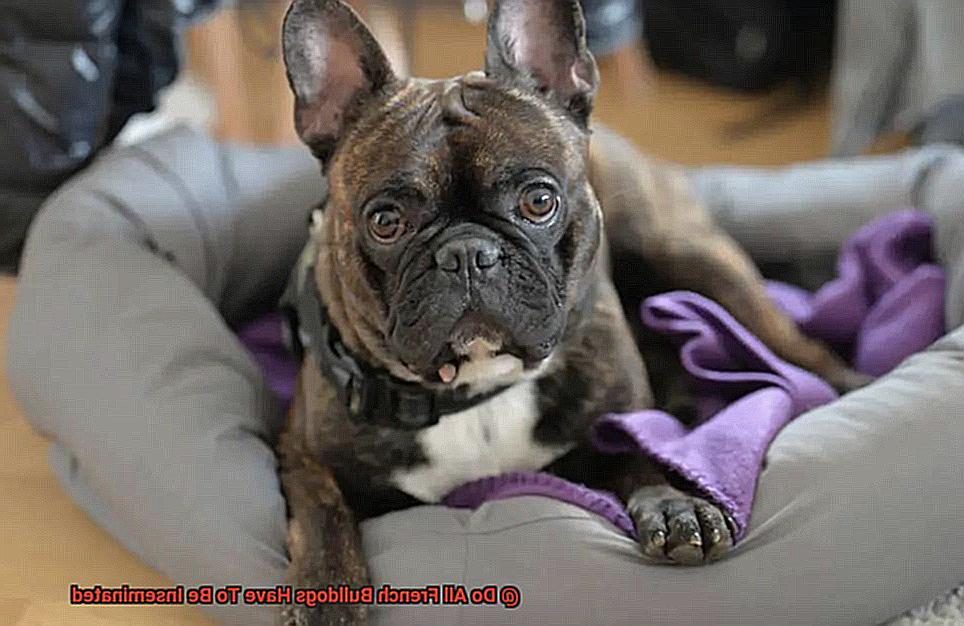
So why do some people believe that insemination is mandatory for these adorable pooches? Well, it all boils down to their unique physical attributes. You see, French Bulldogs possess compact bodies and brachycephalic skulls (that’s just a fancy way of saying they have smushed faces). These characteristics can make natural mating a bit tricky for them. However, it’s crucial to understand that not all French Bulldogs face these reproductive challenges; thus, the need for insemination varies from dog to dog.
Now let’s talk about the benefits of insemination beyond overcoming breeding difficulties in French Bulldogs. Artificial insemination also allows breeders to transcend geographical limitations by transporting semen from highly desirable males – ensuring a broader gene pool for future generations of these delightful pups. Moreover, this technique enables selective breeding where breeders can carefully choose mates that complement each other, aiming to improve breed characteristics like health and temperament.
To sum it up – not all French Bulldogs require insemination for successful reproduction, contrary to popular belief. While insemination is a valuable tool in cases where natural mating poses challenges, it’s crucial to evaluate each dog individually. Responsible breeders prioritize their French Bulldogs’ well-being and use insemination as just one of the many tools in the breeding process – all with the aim of preserving and enhancing this beloved breed for years to come.
So there you have it, folks. The truth about French Bulldogs and insemination. It’s time to dispel the misconceptions and embrace a better understanding of these adorable pooches and their unique reproductive needs
Understanding the Physical Characteristics of French Bulldogs
Contents [show]
French Bulldogs are a small breed of dog that is beloved for their unique physical characteristics. If you’re a proud French Bulldog owner or simply interested in learning more about this adorable breed, this article will provide you with all the information you need to understand their physical traits.
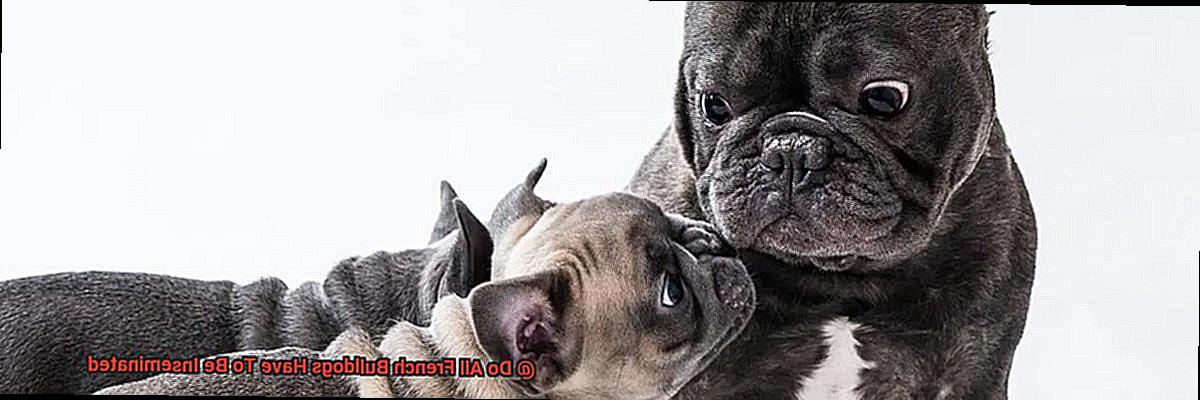
Compact and Muscular Body
French Bulldogs have a compact and muscular body, giving them a sturdy and robust appearance. Despite their small size, they have a strong build that is evident in their well-defined muscles.
Large Square-Shaped Head
One of the most distinctive features of French Bulldogs is their large, square-shaped head. They have a broad forehead and a short muzzle, which gives them an adorable and expressive face.
Bat-Like Ears
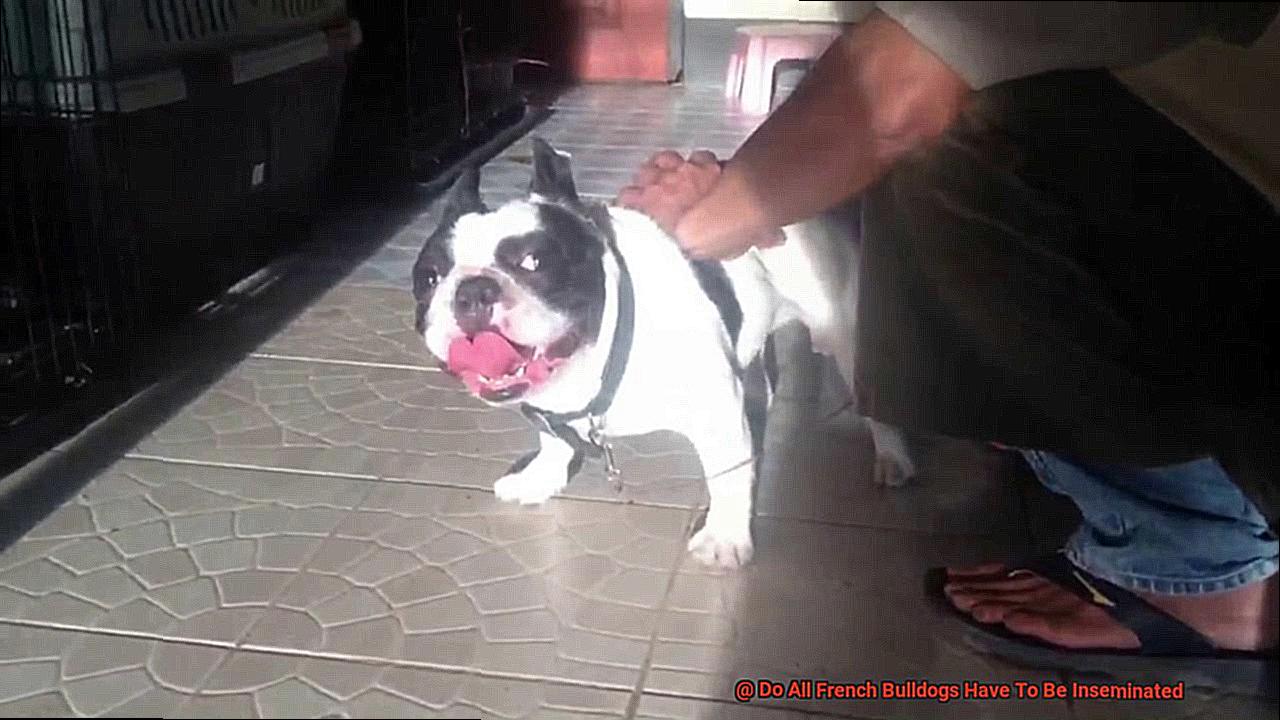
French Bulldogs are known for their bat-like ears that stand erect and slightly rounded at the tips. These ears add to their overall charm and give them a unique and recognizable look.
Expressive Eyes
Their eyes are dark in color and highly expressive. They often convey an alert and intelligent expression, reflecting the breed’s playful and curious nature.
Short and Smooth Coat
French Bulldogs have a short and smooth coat that requires minimal grooming. Their coat comes in various colors, including brindle, fawn, white, and pied, allowing for a range of beautiful appearances.
Characteristic Tail Shape
The tail of a French Bulldog is typically short and straight, with a characteristic “screw” or “corkscrew” shape to it. This tail shape adds to their overall charm and uniqueness.
Size and Weight Range
French Bulldogs are considered a small breed, with males typically weighing between 20-28 pounds and females weighing between 16-24 pounds. Their compact size makes them perfect for apartment living or as companions for families with limited space.
Understanding the physical characteristics of French Bulldogs is essential for appreciating their unique beauty and caring for them properly. Whether it’s their compact and muscular body, bat-like ears, or expressive eyes, every aspect of their appearance adds to their undeniable charm. So, the next time you look at your French Bulldog, take a moment to appreciate their distinct physical traits that make them one of the most beloved breeds in the world.
Common Health Issues in the French Bulldog Breed
French Bulldogs are adorable and lovable companions, but like any other breed, they are prone to certain health issues. Being aware of these common health problems can help owners provide the best care for their furry friends. Let’s take a closer look at some of the most prevalent health issues in French Bulldogs:
- Brachycephalic Syndrome: This condition is characterized by a shortened skull, which can lead to respiratory problems. French Bulldogs have a compacted airway, making it difficult for them to breathe, especially in hot or humid weather. Symptoms may include snoring, wheezing, and difficulty breathing.
- Allergies: French Bulldogs are prone to allergies, including food allergies and environmental allergies. Food allergies can cause gastrointestinal upset, itching, and skin rashes. Environmental allergies can be triggered by things like pollen or dust mites, resulting in itching, redness, and skin infections.
- Hemivertebrae: This spinal deformity occurs when one or more vertebrae are misshapen or malformed. Hemivertebrae can lead to spinal cord compression and cause symptoms such as back pain, difficulty walking, and even paralysis in severe cases.
- Eye Issues: French Bulldogs are susceptible to eye problems such as cherry eye and corneal ulcers. Cherry eye is when the gland of the third eyelid becomes prolapsed and appears as a red mass in the corner of the eye. Corneal ulcers are open sores on the surface of the eye, often caused by trauma or infection.
- Skin Problems: Due to their wrinkled skin, French Bulldogs are prone to skin fold dermatitis. Moisture and bacteria can get trapped in the skin folds, leading to irritation, redness, and infection. They are also susceptible to interdigital cysts, which are painful lumps between the toes caused by inflammation or infection.
- Genetic Disorders: French Bulldogs have a higher risk of developing genetic disorders such as hip dysplasia and patellar luxation. Hip dysplasia is an abnormal formation of the hip joint, causing pain and lameness. Patellar luxation occurs when the kneecap dislocates from its normal position, resulting in limping and difficulty walking.
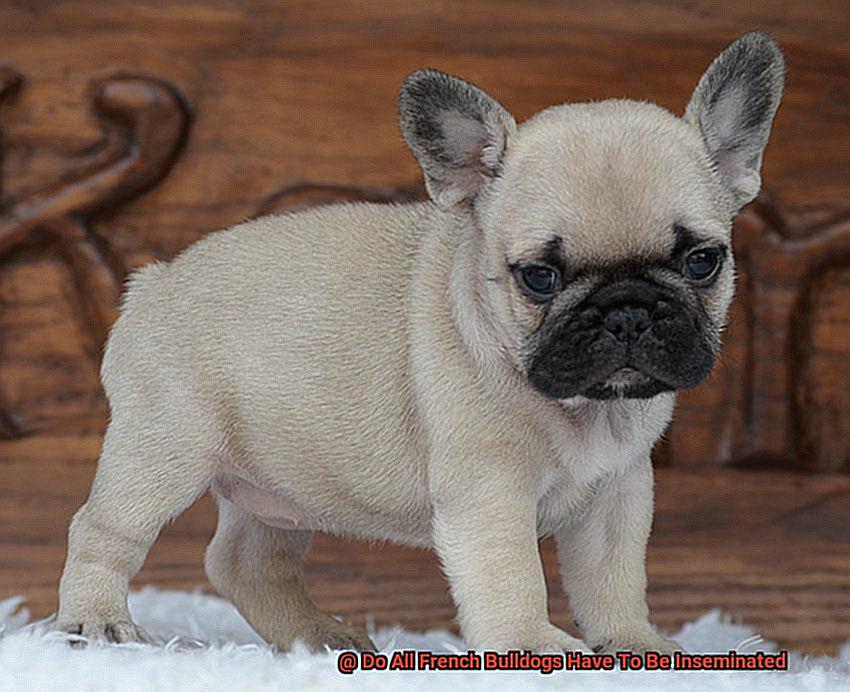
Natural Breeding vs Artificial Insemination for French Bulldogs
French Bulldogs are a beloved breed known for their affectionate nature and distinctive appearance. When it comes to breeding these adorable dogs, breeders have the option of natural breeding or artificial insemination (AI). Both methods have their advantages and disadvantages, and it’s important to consider various factors before making a decision. So, let’s dive into the pros and cons of each method.
Advantages of Natural Breeding:
- Instinctual Mating Process: Natural breeding allows for a more natural and instinctual mating process. Some breeders believe that this is important for the overall health and well-being of the dogs.
- Assessment of Fertility: Breeding naturally provides an opportunity to assess the male’s fertility and mating ability. Observing the male’s behavior, physical condition, and genetic compatibility with the female can help ensure successful breeding.
Disadvantages of Natural Breeding:
- Difficulty Mating: French Bulldogs often face difficulties mating naturally due to their unique body structure and size. The male may struggle to mount the female, and the female may have difficulty accepting the male’s advances.
- Geographical Limitations: Natural breeding restricts breeders to using stud dogs located nearby. This limits breeding options and may result in reduced genetic diversity.
Advantages of Artificial Insemination:
- Overcoming Mating Difficulties: Artificial insemination allows breeders to overcome the mating difficulties faced by French Bulldogs. By manually depositing semen into the female’s reproductive tract, successful breeding can be achieved without the challenges of natural mating.
- Expanded Breeding Options: AI enables breeders to use semen from high-quality stud dogs located anywhere in the world. This expands breeding options and improves genetic diversity, contributing to the overall health of the breed.
- Controlled Timing: With AI, breeders can control the timing of insemination, increasing the chances of a successful pregnancy. By determining the optimal time based on the female’s reproductive cycle, breeders can maximize the chances of conception.
Disadvantages of Artificial Insemination:
- Lack of Natural Mating Experience: Artificial insemination eliminates the natural mating experience for both male and female dogs. Some breeders believe that this may have an impact on their overall well-being and behavior.
- Cost and Expertise: AI requires specialized equipment and expertise, which can add to the overall cost of breeding. Breeders must ensure they have access to the necessary resources and professionals to perform the procedure correctly.

The Benefits of Artificial Insemination for French Bulldogs
Breeding French Bulldogs can be a rewarding yet challenging endeavor. To ensure successful reproduction and maintain the breed’s quality, many breeders turn to artificial insemination (AI). In this blog post, we will explore the numerous benefits that AI offers for French Bulldogs, providing insights based on my experience as a breeder and expert in the field.
Overcoming Physical Limitations:
French Bulldogs have unique body structures that can pose difficulties during natural mating. Their short snouts, compact bodies, and narrow hips make it physically challenging for them to mate successfully. AI eliminates these obstacles, ensuring successful breeding without causing stress or potential injuries to the dogs.
Access to a Wider Gene Pool:
With natural mating, breeders are limited to choosing mates that are physically compatible with their female dogs. However, AI opens up possibilities by allowing breedings with dogs that may be geographically distant or unable to physically mate due to certain conditions. This expands the gene pool and helps maintain genetic diversity within the French Bulldog population.
Control over Breeding Timing:
AI offers breeders greater control over the timing of breeding. By carefully planning and synchronizing the reproductive cycles of their female dogs, breeders can ensure optimal timing for successful conception. This is particularly beneficial when coordinating breedings with stud dogs that possess desirable traits or genetic qualities.
Reduced Risk of Sexually Transmitted Infections (STIs):
Natural mating exposes dogs to various infections transmitted through sexual contact. AI eliminates this risk and prevents the spread of diseases among breeding stock, ensuring the health and well-being of both male and female dogs.
Convenience and Safety:
AI eliminates the need for transporting dogs to different locations for breeding purposes. This reduces stress on the dogs and minimizes the potential for injuries that could occur during natural mating. Additionally, AI provides a safer environment by eliminating potential conflicts or aggressive behavior between dogs.
Better Control over Semen Quality:
Semen collected through AI can be evaluated for quality before being used for breeding. This ensures that only high-quality semen is used, increasing the chances of successful conception and the production of healthy offspring.
Preservation of Genetic Material:
AI enables breeders to preserve and store semen for future use. Frozen semen can be stored for extended periods and used for breeding even after the dog is no longer available or alive. This allows breeders to continue using valuable genetic material and maintain the lineage of exceptional dogs.
Responsible Breeding Practices to Ensure Successful Reproduction
Breeding French Bulldogs requires responsible practices to ensure successful reproduction and the overall health and well-being of both the mother and the puppies. In this article, we will explore some essential practices that all responsible breeders should follow.
Health screenings and genetic tests:
Before breeding, it is crucial to conduct comprehensive health screenings and genetic tests on both the male and female French Bulldogs. These tests can identify potential health issues and genetic defects, allowing breeders to make informed decisions about which dogs to breed. Common tests include hip and elbow evaluations, eye examinations, and DNA testing for known genetic disorders such as brachycephalic syndrome or hereditary deafness.
Selecting healthy and genetically sound dogs:
Responsible breeders should only breed dogs that are healthy, free from any significant health issues or genetic defects. Breeding dogs with known health problems can pass these issues onto their offspring, leading to a higher risk of health complications later in life. By selecting healthy dogs with good temperaments, breeders can improve the overall quality of the breed.
Understanding the breed standard:
Breeders should have a thorough understanding of the French Bulldog breed standard set by kennel clubs such as the American Kennel Club (AKC) or the United Kennel Club (UKC). The breed standard outlines the ideal characteristics for French Bulldogs in terms of appearance, structure, and temperament. Responsible breeders strive to produce puppies that conform to these standards, ensuring that future generations maintain the breed’s integrity.
Proper nutrition and healthcare:
Good nutrition is essential for both the mother dog during pregnancy and lactation and for the growing puppies. A balanced diet that meets their nutritional needs helps support healthy development and growth. Additionally, regular veterinary care, including vaccinations, deworming, and preventive measures against parasites, is crucial to maintain optimal health for both the mother and puppies.
Breeding at the right age:
Female French Bulldogs should be physically mature before breeding, usually around 2 to 3 years old. Breeding too early can result in complications or health issues for the mother and her puppies. Older females may also have a higher risk of complications during pregnancy and delivery. Responsible breeders carefully consider the age and physical condition of their dogs before deciding to breed.
Conclusion:
Responsible breeding practices are vital to ensure successful reproduction in French Bulldogs. By following these practices, breeders can improve the overall health and well-being of the breed, while also preserving its unique characteristics. Remember, responsible breeding should always prioritize the welfare of the dogs and the betterment of the breed over profit.
Factors to Consider Before Choosing Artificial Insemination
Artificial insemination can be a valuable tool in achieving successful pregnancies and maintaining the breed’s desirable traits. However, before opting for this reproductive method, there are several factors that French Bulldog owners should consider. In this article, we will explore these factors to help you make an informed decision.
Health and Genetic Testing:

Before proceeding with artificial insemination, it is crucial to conduct thorough health and genetic testing on both the male and female French Bulldogs involved. This includes screening for common genetic disorders and diseases that may affect the success of the procedure or the health of the puppies. Working with a veterinarian or a reputable reproductive specialist can help identify potential risks and ensure healthy breeding.
Fertility Evaluation:
Assessing the fertility of both the male and female French Bulldogs is essential to determine their ability to successfully achieve pregnancy through artificial insemination. Evaluating the quality of sperm and the condition of the female’s reproductive system can help identify any potential obstacles or issues that may affect conception.
Cost Considerations:
Artificial insemination can involve various expenses, including veterinary fees, semen collection, freezing, storage, and potential additional costs for repeated attempts. It is important to carefully assess your financial situation before committing to this process. Consulting with a veterinarian or reproductive specialist will provide a clearer understanding of the financial commitment involved.
Success Rates:
Understanding the success rates associated with artificial insemination is crucial. Factors such as age, overall health, and fertility of both dogs can impact the likelihood of a positive outcome. Discussing success rates based on individual circumstances with a veterinarian or reproductive specialist can provide valuable insights into your chances of achieving a successful pregnancy.
Time and Commitment:
Artificial insemination requires careful timing and commitment from both the dog owner and the veterinary team. The process involves multiple visits to the veterinarian’s office for semen collection, insemination procedures, and follow-up examinations to monitor pregnancy progression. Consider whether you have the time and dedication necessary to go through this process before committing to artificial insemination.
Breeding Objectives:
Before choosing artificial insemination, it is essential to assess your breeding objectives and goals. Determine the desired traits, temperament, and health qualities you aim to achieve in the offspring. Discussing these objectives with a veterinarian or reproductive specialist will help determine whether artificial insemination aligns with your breeding goals.
Ethical Considerations:
Artificial insemination involves manipulating reproductive processes and may raise ethical concerns for some individuals. It is important to consider the ethical implications before making a decision. Seeking guidance from ethical breeders or professionals in the field can provide valuable insights on navigating these considerations.
How to Find a Reputable Breeder for Your French Bulldog
Bringing home a French Bulldog is an exciting and rewarding experience. However, finding a reputable breeder is crucial to ensure you get a healthy and well-bred puppy. In this blog post, we will provide you with valuable tips on how to find a reputable breeder for your French Bulldog.
Do Your Research:
Start by researching breeders in your area or online. Look for breeders who specialize in French Bulldogs and have a good reputation among the dog community. Online forums and social media groups dedicated to French Bulldogs can be helpful resources for finding recommendations.
Visit the Breeder:
Schedule a visit to the breeder’s facility. This will give you an opportunity to see how the breeder operates and assess the living conditions of the dogs. A reputable breeder will be transparent and open about their breeding practices.
Ask Questions:
During your visit, don’t hesitate to ask the breeder questions about their breeding program. Inquire about the health testing they perform on their breeding dogs, such as hip and elbow evaluations, eye exams, and genetic testing for hereditary diseases common in French Bulldogs. A responsible breeder should have detailed knowledge about the breed and be able to provide you with information on the lineage of their dogs.
Meet the Parents:
Request to meet both the dam (mother) and sire (father) of the puppies you are interested in. This will give you an idea of their temperament and physical characteristics, which can be passed down to their offspring.
Health Guarantee:
A trustworthy breeder will offer a health guarantee for their puppies. Ensure that you understand the terms of the health guarantee before making a commitment.
References and Reviews:
Ask the breeder for references from previous puppy buyers or testimonials from satisfied customers. Additionally, check online reviews and ratings for the breeder to get a broader perspective.
Tips on Caring for a Pregnant French Bulldog
Caring for a pregnant French Bulldog requires special attention and care to ensure the health and well-being of both the mother and her puppies. From providing a comfortable environment to monitoring weight gain, here are some essential tips to help you give the best care to your pregnant French Bulldog.
Create a Calm and Safe Environment:
Pregnant French Bulldogs need a peaceful and stress-free environment. Set up a cozy area with soft bedding where she can rest undisturbed. Make sure the room temperature is moderate and avoid exposing her to extreme temperatures.
Provide Proper Nutrition:
Consult with your veterinarian to determine the appropriate diet for your pregnant French Bulldog. High-quality dog food formulated for pregnant or nursing dogs will provide the essential nutrients she needs. Keep fresh water available at all times for hydration.
Regular Veterinary Check-ups:
Schedule regular check-ups with your vet throughout the pregnancy. They will monitor the progress, administer necessary vaccinations, and address any health concerns that may arise.
Moderate Exercise:
While it’s important to keep your pregnant French Bulldog active, engage in gentle activities such as short walks or play sessions. Avoid strenuous activities that could strain her body or abdomen.
Monitor Weight Gain:
Keep an eye on your dog’s weight throughout the pregnancy. Excessive weight gain can lead to complications during delivery, while insufficient weight gain may affect the puppies’ development. Consult with your vet to ensure a healthy weight gain.
Be Observant and Attentive:
During the later stages of pregnancy, closely monitor your dog for signs of labor. Look out for nesting behaviors, restlessness, loss of appetite, and a drop in body temperature. Contact your veterinarian immediately if you notice any concerns or abnormal symptoms.
Remember, every pregnancy is unique, so it’s crucial to consult with a veterinarian for personalized advice and care instructions throughout the process. By providing proper care and attention, you can help ensure a healthy and successful pregnancy for your French Bulldog.
Conclusion
In conclusion, it is a common misconception that all French Bulldogs must be inseminated.
However, this is not the case. While artificial insemination may be used in some instances, natural breeding is still possible and often preferred by breeders.
Nonetheless, the decision to use artificial insemination or natural breeding should be made in consultation with a veterinarian and based on the specific needs of the individual dog.



